#korean conjugaison
Explore tagged Tumblr posts
Text
Mes sources ~
Grammaire:
Talk To Me In Korean *la nouvelle version du site est visuellement jolie, mais ils ont rendu payant tout le contenu qui était gratuit avant 😬 (Mais les vidéos sont toujours gratuites sur YouTube 🤔) sauf les leçons audio .... Et je ne les écoute pas (trop de blabla), je me sers seulement des fichiers écrits, dont je vais ensuite chercher la traduction sur le site suivant ↓
KoreanWikiProject *contient la plupart des leçons de TTMIK traduites en français + pleins d’autres leçons de grammaires avec des exemples (en anglais)
Naver Dictionary (fr) * pour chercher une structure grammaticale, mettre un “-” (tiret) avant celle ci (ex: “-는데”)
Conjugation de Verbes *taper un verbe dans la barre de recherche et vous avez toutes les conjugaisons, ils vous disent également si le verbe est irrégulier ou pas
○ Maintenant, j’ai plus ou moins comprit les structures grammaticales coréennes (principales), il me manque surtout beaucoup de vocabulaire et j’ai du mal à faire des phrases moi même 😔
Vocabulaire:
Tumblr (mes abonnements)
Naver Dictionary *encore une fois! ce site est aussi, et surtout, très utile pour le vocabulaire, les définitions et contient énormément d’exemples! Pour plus d’exemples, on peut aller sur la page en anglais, et pour vérifier qu’une définition est bien vraie, aller sur la page en 100% coréen (la plus complète, forcément)
Hanja * taper un mot en hanja (la barre de recherche est en haut de la phrase qui commence par “60 % ...”) et ils vont vous sortir tout les mots dérivés de ce hanja
#vocabulaire#langblr#studyblr#korean langblr#korean studyblr#coréen#korean#langblr coréen#studyblr coréen#vocabulaire coréen#language#korea#corée#한국 연구#한국연구#한국학#한국어#한국어배우기#한국어공부중#한국어를#한국#어휘#grammaire#grammaire coréenne#문법
15 notes
·
View notes
Text
Past tense 과거 시제
You’ll get the rule, examples and practices to do
Polite form: Verb stem +았/었/였+어요
Very polite: Verb stem +았/었/였+습니다
Casual: Verb stem +았/었/였+어
Verb stem : verb - 다
★필요하다: To need 필요하
★내리다 : To get off 내리
★(잠을) 자다 : To sleep 잠을 자
★결혼하다: To get married 렬혼하
★보이다: To be seen, to be visible 보이
★바꾸다 : To change 바꾸
★놀다: To play, to hang out 놀 … 등
~If the verb stem's last vowel is ㅏ or ㅗ : then 았어(요) is used
Examples (예문) :
★만나다 ( to meet)=>만나 만났어요
저는 지난 주말에 친구를 만났어요 I met my friend last weekend
★가다 (to go)=> 가 갔어요
저는 카페에 갔어요 I went to the café
★오다 (to come)=> 오 왔어요
집에 왔어요 I came home
~If the verb stem's last vowel is Not ㅏor ㅗ: then 었어(요) is used
Examples (예문) :
★주다 (to give)=>주 줬어요
아빠가 저한테 선물을 줬어요 My dad gave me a gift/ a present
★마시다 (to drink)=> 마시 ���셨어요 (마시+었어=마셨어 )
커피를 마셨어요 I drank coffee
★먹다(to eat) => 먹 먹었어요
딸기 케이크를 먹었어요 I ate strawberry cake
★웃다 (to smile, to laugh ) => 웃 웃었어요
친구가 웃었어요 My friend smiled
★보이다 (to be seen, be visible ) =>보이 보였어요
그 케이드라마에 한국 음식이 맛있게 보였어요 Korean food looked so delicious in that kdrama
~If the verb stem ends with 하 you add 였어요 (하+였어요 =했어요) To put it simply 하changes to 해
Examples (예문) :
★사랑하다 (to love)=> 사랑하 사랑했어요
저는 너를 사랑했어요 I loved you
★요리하다 (to cook) => 요리하 요리했어요
저는 점심을 요리했어요 I cooked lunch
★공부하다 (to study)=> 공부하 공부했어요
하루종일 한국어를 공부했어요 I studied korean all day
~So how can we turn the past tense to formal?
Verb stem +았/었/였+습니다 Instead of 어요, (Verb stem +았/었/였+어요) we replace it with 습니다
★필요하다: To need 필요했습니다
★내리다 : To get off 내렸습니다
★잠을 자다 : To sleep 잠을 잤습니다
★결혼하다: To get married 렬혼했습니다
★보이다: To be seen, to be visible 보였습니다
★바꾸다 : To change 바꿨습니다
★놀다: To play, to hang out 놀았습니다
Practice (연습) :
★I ate an apple
먹다: To eat 저는 사과를 …..
★Last week I drank water every morning
마시다: To drink 지난 주에 저는 맨날 물을 …..
★I drove a car
운정하다:To drive 저는 차를 …..
★I gave present to my friends
주다:to give 저는 제 친구에게 선물을 …..
★I studied korean
공부하다 :To study 저는 한국어를 ….
★I woke up and then I drank water
일어나다: To get up, to wake up 물을 마시다:To drink water 저는 ….
★I studied math and then slept
수학을 공부하다: To study math 잠을 자다: To sleep 저는….
★I drank milk and I ate fruits
우유 마시다: To drink milk 과일을 먹다:To eat fruits 저는…..
Support me at: https://ko-fi.com/koreanwithhaneul
#korean#korean with haneul#hangul#korean conjugaison#korean conversation#coréen#apprendre#bts army#korean alphabet#korean vocabulary#korean vocab list#korean vocaloid#korean study notes#korean study blog#korean blog#korean language#learn korean#korean learning#korean lesson#korean langblr#korean sentence#korean studies#korean studygram#study korean#studystudystudy#learnkorean#learning korean#language study#studykorean#study space
10 notes
·
View notes
Text
Future tense 미래 시제
You'll get the rule, examples and practices to do
Polite form: Verb stem + (으) ㄹ 거예요
Very polite: Verb stem + (으) ㄹ 겁니다
Casual: Verb stem + (으) ㄹ 거야
Verb stem : verb - 다
★가다: To go 가
★오다: To come 오
★자다: To sleep 자
★사랑하다: to love 사랑하
★만나다: To meet 만나
★보다: To see 보
★읽다: To read 읽
… 등
~If the verb stem ends with a vowel, then ㄹ 거예요 is used
Examples (예문) :
★만나다 ( to meet)=>만나 만날 거예요
저는 주말에 친구를 만날 거예요. I will meet my friend on the weekend
★가다 (to go)=> 가 갈 거예요
저는 카페에 갈 거예요. I'm going to the café ( I will go to café)
★오다 (to come)=> 오 올 거예요
집에 올 거예요. I'm coming home
★주다 (to give)=>주 줄 거예요.
아빠가 저한테 선물을 줄 거예요. My dad will give me a gift
★마시다 (to drink)=> 마시 마실 거예요
커피를 마실 거예요. I will drink coffee
★사랑하다 (to love)=> 사랑하 사랑할 거예요.
저는 너를 항상 사랑할 거예요 I will always love you
★요리하다 (to cook) => 요리하 요리할 거예요
저는 점심을 요리할 거예요. I will cook lunch
★공부하다 (to study)=> 공부하 공부할 거예요
한국어를 공부할 거예요. I will study korean
~If the verb stem ends with a consonant, then 을 거예요 is used
Examples 예문:
★앉다 (to sit down)=> 앉 앉을 거예요
여기 앉을 거예요. I'm going to sit here
★먹다(to eat) => 먹 먹을 거예요.
딸기 케이크 먹을 거예요. I am going to eat strawberry cake
★웃다 (to smile, to laugh ) => 웃 웃을 거예요
항상 웃을 거예요. I will always smile
★없다 (to not have, to not be at (place) ) => 없 없을 거예요
다음 주에 집에 없을 거예요 I won't be home next week.
~If the verb stem ends with ㄹ then you just add 거예요 to it
Examples (예문):
★놀다 (to play, hang out) =>놀 놀 거예요
제가 친구랑 같이 놀 거예요. I will hang out with my friends
★살다 (to live)=> 살 살 거예요.
내년에 한국에 살 거예요 Next year I'm going to live in Korea
★팔다 (to sell)=>팔 팔 거예요
제 핸드폰을 팔 거예요. I am going to sell my phone
★울다 ( to cry) => 울 울 거예요
내가 원하면 울거야 I'll cry if I want to
Practice 연습:
★I will drink some water
to drink: 마시다 나는 물을 ….
★I will work out daily from now on
to work out: 운동하다 이제부터 매일 ….
★I will buy stickers
to buy: 사다 스티커를 ….
★I will give presents to my friends To give: 주다 친구들에게 선물을 ….
★I will study korean this afternoon
to study: 공부하다 오늘 오후에 한국어를 ……
Support me at: https://ko-fi.com/koreanwithhaneul
#korean#korean with haneul#hangul#coréen#korean conjugaison#korean conversation#apprendre#korean alphabet#korean language#korean learning#korean lesson#korean langblr#korean blog#korean study blog#korean vocabulary#korean vocab list#korean vocaloid#bts army#learnkorean#learning korean#language study#learn korean#study korean#studystudystudy#studykorean#korean sentence#korean studies#korean study notes#study space#south korea
7 notes
·
View notes
Text


#korean language#korean#korean alphabet#korean with haneul#hangul#korean conjugaison#korean conversation#coréen#korean vocaloid#korean vocab list#korean vocabulary#learn korean#korean drama#kdrama#kpop#south korea#learnkorean#learning korean#language study#korean learning#korean lesson#korean sentence#korean study blog#korean blog#korean studies#korean study notes#study korean#studystudystudy#study space#studykorean
7 notes
·
View notes
Note
Bonjour
J'ai une question bête
Je voudrais savoir comment on écrit en coréen
Mots ou chiffres "sino-coréen" mots ou chiffres "pur coréen".
Dans des livres on voit beaucoup de mots traduits comme mots , vocabulaire, verbes, adjectifs, grammaire etc mais jamais ces mots là et ne voudrais savoir.
Merci
Bonne journée
I'll first answer in French and then in English.
Pour les numéros coréen purs (하나, 둘, 셋….. Etc)
◕On les appelle:고유어 수사
Et pour les numéros sino-coréen (일, 이, 삼, 사… Etc)
◕On les appelle: 한자어 수사
J'aimerais aussi ajouter que ces termes sont rarement utilisés même par des personnes coréens. Normalement on dit : 숫자 /수 pour les numéros
~◕~◕~◕~◕~
Korean pure numbers (하나, 둘, 셋….. Etc)
◕They are called 고유어 수사 in Korean
Sino korean numbers (일, 이, 삼, 사… Etc)
◕They are called 한자어 수사 in Korean
N.B. These terms "고유어 수사" and "한자어 수사" aren't used that much even by Korean people
Hope that helped ^^
#korean#korean alphabet#korean language#learn korean#korean learning#korean lesson#korean with haneul#hangul#korean vocaloid#korean vocab list#korean vocabulary#korean conjugaison#korean conversation#coréen#korean sentence#korean study notes#korean studies#korean study blog#learnkorean#learning korean#language study#study korean#studystudystudy#study space#studykorean#korean drama#kdrama#kpop#south korea#apprendre
3 notes
·
View notes
Text
Let's talk about hobbies (in korean)! 취미에 대해 말합시다! (loisirs, الهوايات)
How to ask and answers questions about hobbies, Comment poser et répondre aux questions sur les loisirs, كيف تسأل وتجيب على الأسئلة المتعلقة بالهوايات:
❀취미가 뭐예요?
What is your hobby? /What are your hobbies? Quel est votre passe-temps ? /Quels sont vos loisirs? ما هي هوايتك؟ / ما هي هواياتك؟
❀뭘 하는 걸 좋아해요?
What do you like to do? qu'est-ce que tu aimes faire ? ماذا تحب ان تفعل؟
❀….. 는 걸 좋아해요?
Do you like…. ? Tu aimes…. ? هل تحب ….؟
❀재미로 뭘 하는 걸 좋아해요?
What do you like to do for fun/ as a hobby? Qu'aimez-vous faire pour vous amuser? ماذا تحب أن تفعل كهواية؟ ماذا تحب أن تفعل كهواية؟
❀시간 남을 때 뭐 해요?
What do you do in your free time? Que faites-vous pendant votre temps libre? ماذا تفعل في وقت فراغك؟
❀자유시간 있을 때 뭐하는 걸 좋아해요?
What do you like to do in your free time? Qu'est-ce que vous aimez faire pendant ton temps libre? ماذا تحب ان تفعل في وقت فراغك؟
❀스포츠를 할 수 있어요?
Can you do any sports? Faites-vous du sport? هل تمارس أي رياضة؟
❀V-는 거 좋아해요?
Do you like… ? Aimez-vous… ? هل تحب… ؟
❀V-는 제 취미예요
…… is my hobby …… est mon passe-temps …… هي هوايتي
❀제 취미는 N-이에요/예요
My hobby is …… Mon passe-temps est …… …… هوايتي هي
❀N-이에요/예요
It's……. C'est ….. إنه ……
취미 Hobbies :
★reading: 독서 lecture , القراءة
★cooking: 요리, 요리하는 것 cuisine , الطبخ
★watching movies: 영화보기 regarder des films, مشاهدة الافلام
★watching TV: 티비를 보기, 티비 보는 것 regarder la télévision, مشاهدة التلفاز
★watching dramas: 드라마보기 regarder des drames/series, مشاهدة الدراما
★surfing Internet: 인터넷하기 surfer sur Internet, تصفح الإنترنت
★language learning: 언어 베우기 apprentissage des langues, تعلم اللغة
★blogging: 블로깅 bloguer,
★spending time with friends: 친구하고 시간을 보내기 passer du temps avec des amis, قضاء الوقت مع الأصدقاء
★listening to music: 음악듣기, 음막 듣는 것 écouter de la musique, الاستماع إلى الموسيقى
★singing: 노래하기, 노래하는 거 chant, الغناء
★playing the piano: 피아노 치는 것 jouer du piano, العزف على البيانو
★playing the guitar: 기타를 치는 것 jouer de la guitare, العزف على الجيتار
★playing the drums: 드럼 치는 것 jouer de la batterie, العزف على الطبول
★playing violin: 바이올린 치는 것 jouer du violon, العزف على الكمان
★drawing, painting: 그림 그리기, 그림 그리는 것 dessin, peinture, الرسم
★pottery: 도예 하는것 poterie , الفخار
★calligraphy: 서예 하는 것 calligraphie, فن الخط
★sewing: 바느질 couture, الخياطة
★knitting, crochet: 뜨개질 tricoter, crochet, حياكة كروشيه
★photography: 사진 찍기, 사진을 찍는 것 photographie , التصوير الفوتوغرافي
Support me at: https://ko-fi.com/koreanwithhaneul
#korean#korean alphabet#korean with haneul#hangul#coréen#korean vocabulary#korean vocab list#korean vocaloid#korean language#korean lesson#korean learning#korean langblr#korean sentence#korean studies#korean conversation#korean conjugaison#korean study notes#korean study blog#korean blog#bts army#apprendre#study korean#studystudystudy#study space#language study#studykorean#learnkorean#learning korean#learn korean#south korea
6 notes
·
View notes
Text
Days of the week in korean 요일 (and more)
✺Monday: 월요일, Lundi, الاثنين 월:moon, month; lune, mois ; القمر ، الشهر
난 월요일이 싫어. I don't like Mondays. أنا أكره يوم الاثنين انا لا احب الاثنين. Je n'aime pas les lundis
✺Tuesday: 화요일, Mardi, الثلاثاء 화: fire, anger; feu, rage; نار ، غضب
그 프로젝트는 화요일 에 이미 완료되었습니다. The project was already finished on Tuesday. تم الانتهاء من المشروع بالفعل يوم الثلاثاء Le projet était déjà terminé mardi.
✺Wednesday: 수요일, Mercredi, الأربعاء 수: water, number; eau, numéro; الماء ،عدد
Ali 삼촌이 수요일에 방문할 거예요. Uncle Ali nwill visit on Wednesday. العم علي سيزور يوم الأربعاء. L'oncle Ali viendra mercredi.
✺Thursday: 목요일, Jeudi, 목: wood, neck/throat; bois, nuque/gorge; خشب ، رقبة / حلق
오늘은 목요일입니다. Today is Thursday. اليوم هو الخميس. Aujourd'hui, c'est jeudi.
✺Friday: 금요일, Vendredi, الجمعة 금: gold; or; ذهب
오늘은 무슨 요일이에요? 오늘은 금요일이예요. What day is it today? Today is Friday. ماهو اليوم؟ اليوم الجمعة. Quel jour sommes-nous aujourd'hui ? Aujourd'hui, c'est vendredi.
✺Saturday: 토요일 , Samedi, السبت토: soil, terre, تربة
토요일은 많은 사람들에게 있어 여가를 즐기며 휴식하는 날입니다. Saturday is a day for many people to enjoy themselves and relax. بالنسبة لكثير من الناس ، يعتبر يوم السبت يومًا للراحة والاسترخاء. Samedi, c'est un jour de repos pour beaucoup de gens, tout en profitant de leurs loisirs.
✺Sunday: 일요일 , Dimanche, الأحد 일: day, job/work, a matter; jour, travail; يوم: العمل ، مسألة
오늘 일요일인데도 일하러 가야 돼요. Although it's Sunday today, I have to go to work. على الرغم من أن اليوم هو الأحد ، يجب أن أذهب إلى العمل. Même si c'est dimanche, je dois aller travailler.
Other related words (d'autres mots, كلمات أخرى ذات صلة):
★평일: weekday, jour de la semaine, يوم من أيام الأسبوع
★주중: weekdays, jours de la semaine, أيام الأسبوع
★주말: weekend, week-end, عطلة نهاية الأسبوع
★요일: Day of the week, Jour de la semaine, يوم الأسبوع
★주일: weekdays, Jours de la semaine, أيام الأسبوع So when you add numbers (sino-Korean system) :
*일주일:one week, une semaine, أسبوع *이주일: 2 weeks, 2 semaines, أسبوعان *삼주일: 3 weeks, 3 semaines, ثلاثة أسابيع
★지난주: last week, la semaine dernière, الأسبوع الماضي
★지난주말: last weekend, le week-end dernier, نهاية الأسبوع الماضي
*지난 is the verb 지나다: to go by, to pass by,passer, يمر . So it literally means: the week/weekend that went by (Cela signifie donc littéralement : la semaine/le week-end qui s'est écoulé, لذلك فهي تعني حرفيا: الأسبوع / نهاية الأسبوع التي مرت)
★다음주: next week, la semaine prochaine, الأسبوع المقبل
★다음주말: next weekend, le week-end prochain, نهاية الأسبوع المقبل
*다음:next, following, then.., suivant, puis..., التالي ، ثم
Support me at: https://ko-fi.com/koreanwithhaneul
#korean#korean with haneul#hangul#korean language#learn korean#korean alphabet#korean vocabulary#korean vocab list#korean vocaloid#coréen#bts army#apprendre#korean conjugaison#korean conversation#korean learning#korean lesson#korean langblr#korean blog#korean study blog#korean sentence#korean studies#korean study notes#study korean#studystudystudy#study space#language study#studykorean#learnkorean#learning korean#south korea
3 notes
·
View notes
Text
Colours in Korean 색깔
I'll share colors in Korean, English, French and Arabic
★검정색/ 까만색/ 검은색: Black, Noir, أسود
★갈색: Brown, Marron, بني
★빨간색: Red, Rouge, أحمر
★주황색/ 오렌지색: Orange, برتقالي
★노란색: Yellow, Jaune, أصفر
★금색: Gold, Doré/Or, ذهبي
★초록색/녹색: Green, Vert, أخضر
★파란색: Blue, bleu, أزرق
★하늘색: Sky Blue, bleu ciel, أزرق سماوي
★보라색: Purple, Violet, أرجواني/بنفسجي
★분홍색/ 핑크색: Pink, Rose, وردي
★회색: Grey, Gris, رمادي
★은색: Silver, Argenté, فضي
★하얀색/ 흰색: White, Blanc, أبيض
Other Vocabulary:
★부드러운색: Soft color, couleurs douces, لون ناعم
★선명한색: Vivid color, Couleurs vives, ألوان زاهية
★어두운색: Dark color, Couleur foncée, لون غامق
★밝은색: Light color, couleur claire, لون فاتح
★파스텔톤의색 Pastel tone colours, Couleurs pastel, ألوان الباستيل
Support me at: https://ko-fi.com/koreanwithhaneul
#korean#korean with haneul#hangul#korean vocabulary#korean vocab list#korean vocaloid#korean alphabet#korean language#korean learning#korean lesson#korean sentence#korean study notes#korean study blog#korean studies#learnkorean#apprendre#coréen#korean conversation#korean conjugaison#learning korean#language study#learn korean#study korean#studystudystudy#study space#studykorean#south korea#bts army#korean drama#kdrama
6 notes
·
View notes
Text
Present tense 현재 시제
Verb stem +아/어/여요 아요 어요 여요
You'll get the rule, examples and practices to do
Verb stem : verb - 다
★가다: To go 가
★오다: To come 오
★자다: To sleep 자
★사랑하다: to love 사랑하
★만나다: To meet 만나
★보다: To see 보
★읽다: To read 읽
★놀다: To play, to hang out 놀
★쉬다: To rest, relax, take a rest ?
★생각하다:To think ?
★공부하다:to study ?
★말하다:To talk, speak ?
★입다:To wear (clothes) ? … 등
~If the verb stem's last vowel is ㅏ or ㅗ : then 아(요) is used
Examples (예문) :
★만나다 =>만나 만나요
저는 주말에 친구를 항상 만나요 I alway meet my friend on the weekend
★가다 => 가 가요
저는 카페에 가요 I'm going to the café (lit: I go to café)
★앉다 => 앉 (to sit down) 앉아요
여기 앉아요 Sit here
★오다 => 오 와요
집에 와요 I'm coming home
★보다:To see ?
★자다:to sleep ?
★좋다:To be good, nice ?
~If the verb stem's last vowel is Not ㅏor ㅗ: then 어(요) is used
Examples 예문:
★주다=>주 줘요
아빠가 저한테 선물을 줘요 My dad is giving me a gift
★먹다 => 먹 먹어요
딸기 케이크 먹어요 I am eating strawberry cake
★마시다 => 마시 마셔 (마시+어=마셔)
커피를 마셔요 I drink coffee
★웃다 (to smile, to laugh ) => 웃 웃어요
항상 웃어요 Always smile
★보이다 (to be seen, be visible ) =>보이 보여요
한국 음식이 맛있게 보여요 Korean food looks delicious
★재미있다:To be fun, interesting, ?
★힘들다:To be hard, tough ?
★쉬다: To rest, relax ?
~If the verb stem ends with 하 you add 여요 (하+여요 =햐요 To put it simply 하 changes to 해
Examples (예문):
★사랑하다 => 사랑하 사랑해
저는 너를 사랑해요 I love you
★요리하다 => 요리하 요리해요
저는 점심을 요리해요 I cook lunch
★공부하다 => 공부하 공부해요
한국어를 공부해요 I study korean
★말하다 :To speak, talk ?
★운동하다:To work out ?
★하다: To do ?
Practice 연습:
★I eat an apple
먹다: To eat 저는 사과를 …..
★I drink water every morning
마시다: To drink 저는 맨날 물을 …..
★I drive my car
운정하다:To drive 저는 차를 …..
★I give present to my friends
주다:to give 저는 제 친구에게 선물을 …..
★I often study korean
공부하다 :To study 저는 한국어를 자주….
Support me at: https://ko-fi.com/koreanwithhaneul
#korean#korean language#korean with haneul#hangul#coréen#korean conjugaison#korean conversation#apprendre#korean alphabet#learn korean#korean learning#korean lesson#learnkorean#learning korean#language study#korean study blog#korean blog#korean sentence#korean study notes#korean studies#study korean#studystudystudy#study space#studykorean#south korea#korean drama#kdrama#kpop#bts army#korean vocaloid
3 notes
·
View notes
Text
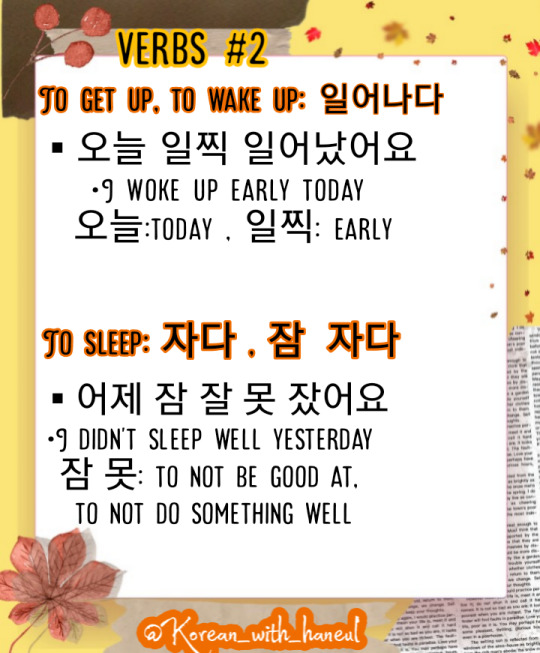

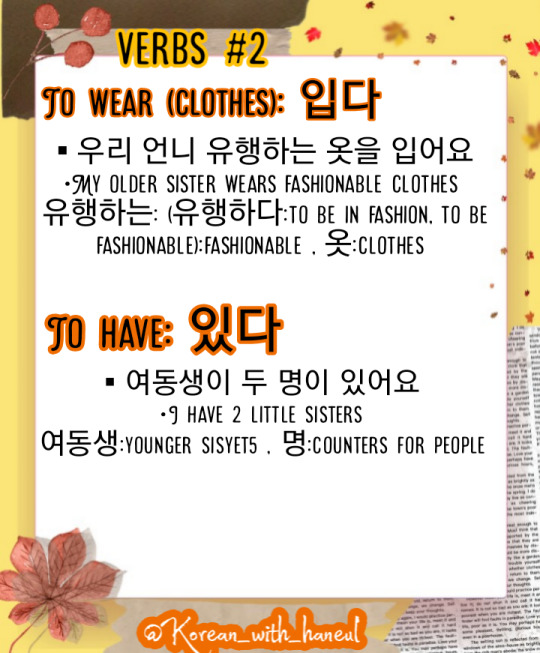

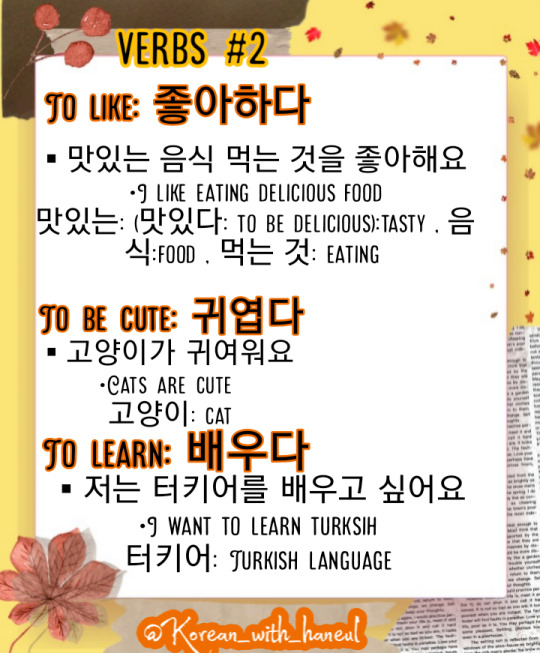

#korean#hangul#korean with haneul#korean alphabet#korean language#korean learning#korean lesson#coréen#korean conversation#korean conjugaison#korean vocaloid#korean vocab list#korean vocabulary#bts army#apprendre#korean sentence#korean studies#korean study blog#korean study notes#korean langblr#learnkorean#learning korean#language study#learn korean#study korean#studystudystudy#study space#south korea#studykorean#korean drama
3 notes
·
View notes
Text
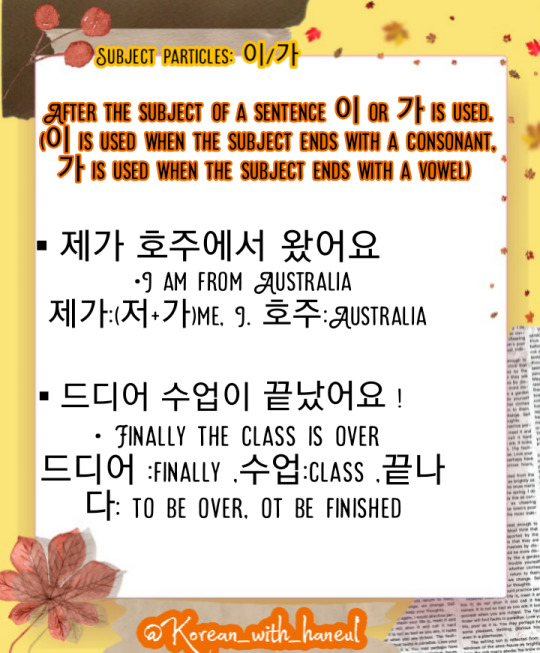

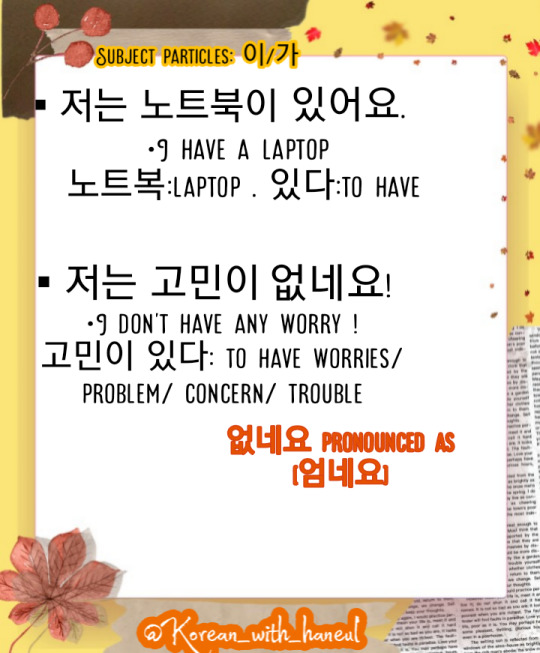
#korean#korean language#learn korean#korean lesson#korean learning#korean sentence#korean studies#korean study notes#korean study blog#korean alphabet#korean with haneul#hangul#korean conjugaison#korean conversation#korean vocabulary#korean vocab list#korean vocaloid#study korean#studystudystudy#study space#language study#south korea#studykorean#study blog#study motivation#learnkorean#learning korean#coréen#bts army#kdrama
2 notes
·
View notes
Text
Korean Pronunciation tip#9
▪ «ㅎ+ㅇ»
If ㅎ is the final consonant in a syllable and his filled by ㅇ, it's dopreed and not pronounced
✺쌓은 is pronouced as [싸은]: piled up, Stacked up.
쌓다: to pile up, to stack up)
✺좋아 is pronouced as [조아]: good
좋다: to be good
As you can see, ㅎ sound becomes dead when there is ㅇ after ㅎ in a word.
Let's see more examples:
✺날씨가 좋으니까 기분도 좋다.
As the weather is good, I also feel good.
✺내 키만큼 쌓인 눈을 다 치워야 했다.
I had to clean the snow whose height was as tall as mine.
In the words, 좋으니까, 쌓인, ㅎ sound is completely dead. It's just [조으니까], [싸인].
키만큼 : as tall as i am
치우다: to tidy up, to clean
#korean#korean alphabet#korean with haneul#hangul#korean pronunciation#korean practice#korean language#korean lesson#korean learning#korean sentence#korean studies#korean study notes#korean study blog#korean vocab list#korean vocabulary#korean vocaloid#korean conjugaison#korean conversation#learnkorean#learning korean#language study#learn korean#study korean#studystudystudy#study space#south korea#studykorean#study blog#study motivation#coréen
3 notes
·
View notes
Text
Korean Pronunciation tip#8
▪ㄱ,ㄲ,ㅋ + «ㄴ or ㅁ» -----> ㅇ
✺먹는 것 is pronouced as [멍는 것]: eating (the fact of eating)
It's the verb 먹다 to eat
✺악몽 is pronouced as [앙몽]: nightmare
✺적는 것 is pronouced as [정는 겉]: writing down
적다 as verb means to write down, and as a descriptive verb it means: to be a few (There are few people today :오늘 사람들이 적어요)
✺깎는 is pronouced as [깡는]: peeling
It's the verb 깎다 which means to peel, and to reduce the price
✺국물 is pronouced as [궁물]: broth
국 in this case means soup (a liquidy kind of soup) and 물 means water so literally it's: soup water (broth)
✺국민 is pronouced as [궁민]: the public, people, nation
▪ㅍ,ㅂ + «ㄴ or ㅁ» ----> ㅁ
✺합니다 is pronouced as [함니다]: to do (very formal)
It's the verb 하다 which means to do
✺춥네요 is pronouced as [춤네요]: its cold!
Its the verb 춥다 which means: to be cold
✺업는 is pronouced as [엄는]: carrying something on one's back
it's the verb 업다: to carry something on one's back
✺접는 is pronouced as [점는]: folding
접다: to fold
✺감사합니다 is pronouced as [감사함니다]: thank you
감사하다: to thank, to be grateful, to be thankful
✺앞문 is pronouced as [암문]: front door
앞 means : front, and 문 means door
▪ㄷ,ㅌ,ㅅ,ㅆ,ㅈ,ㅊ,ㅎ + «ㄴ or ㅁ» -----> ㄴ
✺있는 거 is pronouced as [인는 거]:(thing) that exist
있다: to exist
✺놓는 is pronouced as [논는]: putting, placing, laying
놓다: to put, place, lay
✺닿는 is pronouced as [단는]: touching, reaching
닿다: to reach, to touch
✺듣는 is pronouced as [든는]: listening
듣다: to listen, to hear
✺몇 년 is pronouced as [면 년]: (how) many years
✺솟는 is pronouced as [솟는]: rising
솟다: to soar, rise
#korean#korean with haneul#hangul#korean pronunciation#korean alphabet#korean practice#korean vocabulary#korean vocab list#korean vocaloid#korean language#korean lesson#korean learning#learnkorean#learning korean#language study#learn korean#korean conjugaison#korean conversation#korean sentence#korean studies#korean study notes#korean study blog#study korean#studystudystudy#study space#south korea#korean drama#kdrama#kpop#bts army
6 notes
·
View notes
Text

Bits of motivation for the day !
#korean#korean alphabet#korean language#learn korean#korean lesson#korean learning#korean sentence#korean studies#korean study notes#korean study blog#korean quotes#korean practice#korean pronunciation#korean conjugaison#korean conversation#korean drama#kdrama#kpop#south korea#study korean#learnkorean#learning korean#korean with haneul#hangul#language study#studystudystudy#study space#studykorean#study motivation#coréen
2 notes
·
View notes
Text
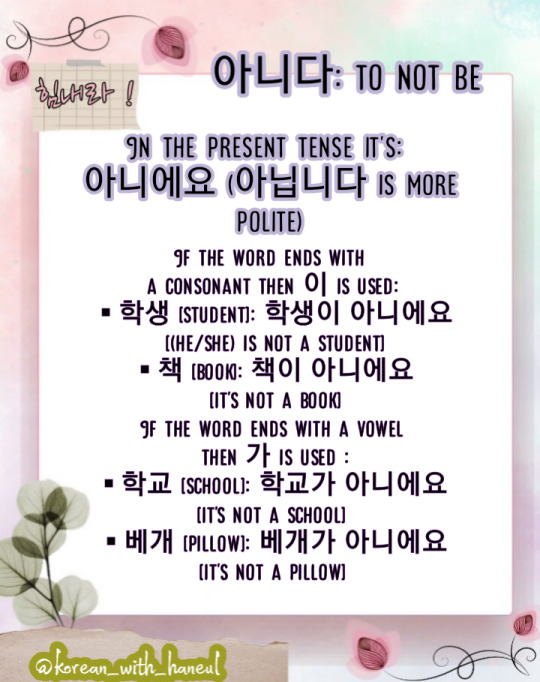
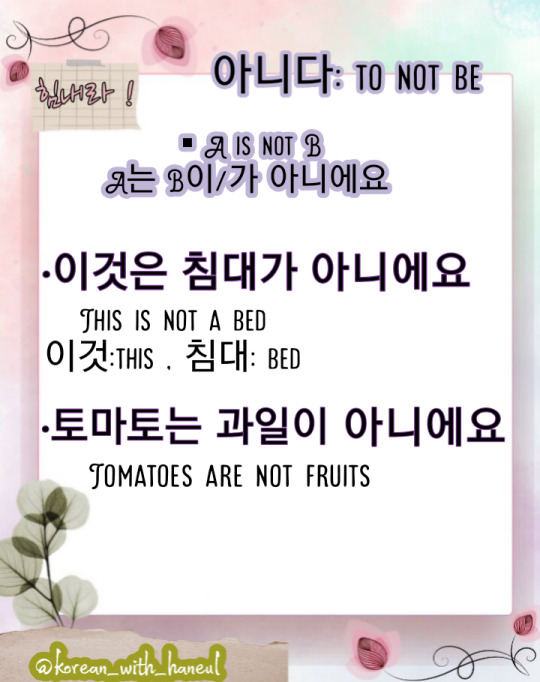
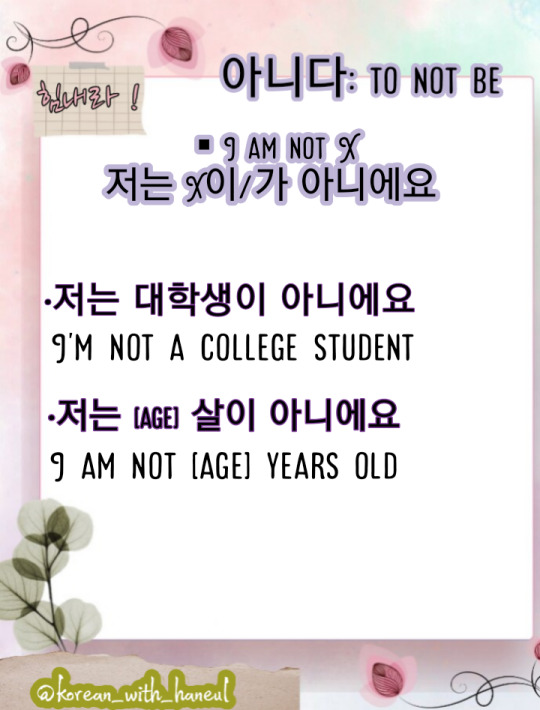
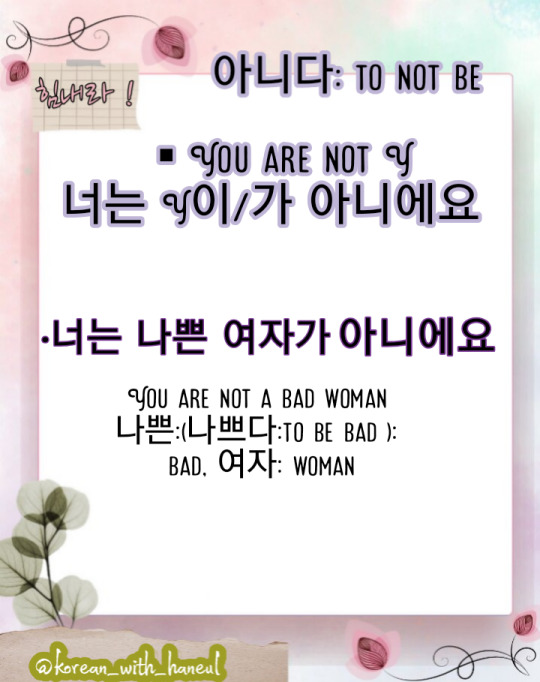
#korean#learn korean#korean alphabet#korean language#korean grammar#korean conjugaison#korean conversation#korean lesson#korean learning#korean drama#kdrama#south korea#kpop#korean with haneul#hangul#study korean#korean sentence#korean studies#korean study notes#korean study blog#apprendre#bts army#language study#learnkorean#learning korean#studystudystudy#study space#studykorean#study motivation#coréen
3 notes
·
View notes
Text

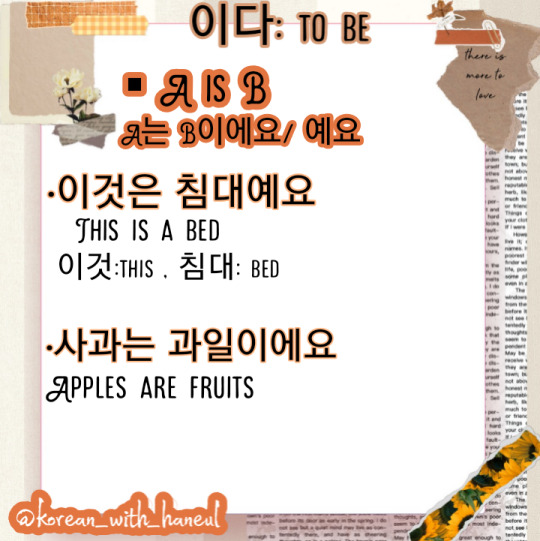
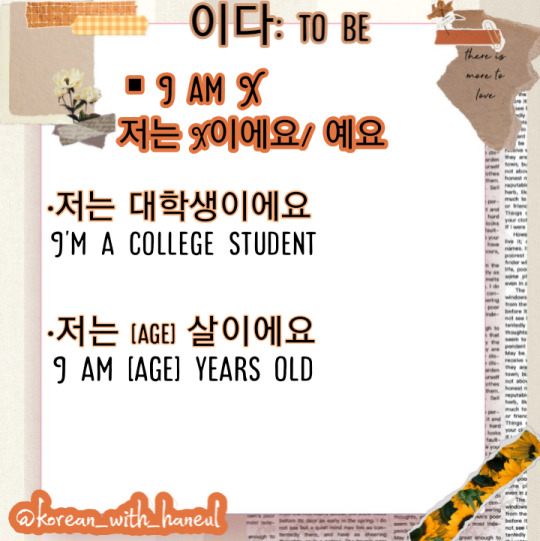

#korean#korean language#learn korean#south korea#korean alphabet#korean conversation#korean conjugaison#korean drama#kdrama#kpop#korean pronunciation#korean practice#korean with haneul#hangul#learnkorean#learning korean#language study#korean sentence#korean studies#korean study notes#korean study blog#study korean#studystudystudy#study space#korean learning#korean lesson#coréen#bts army#apprendre#studykorean
2 notes
·
View notes